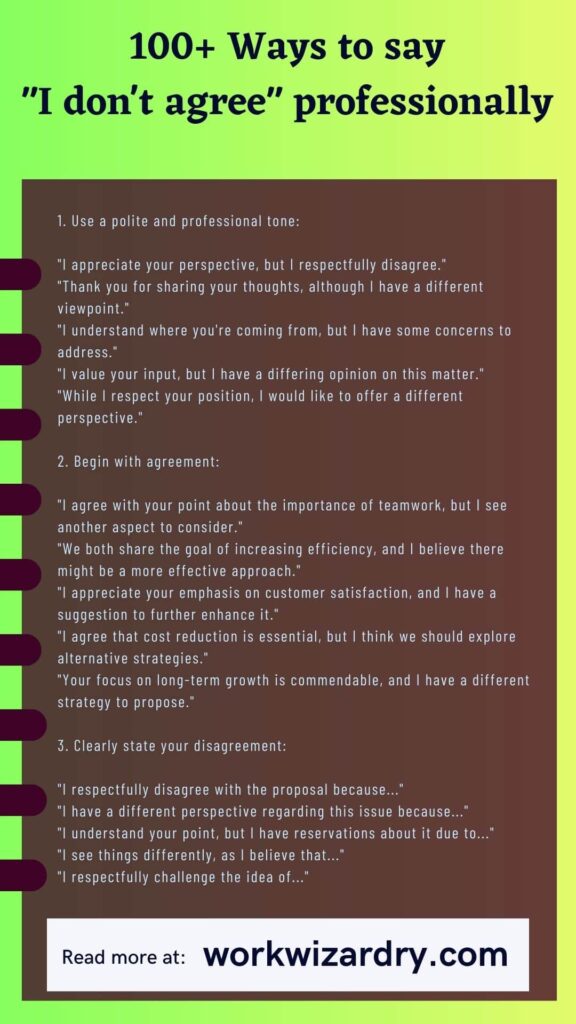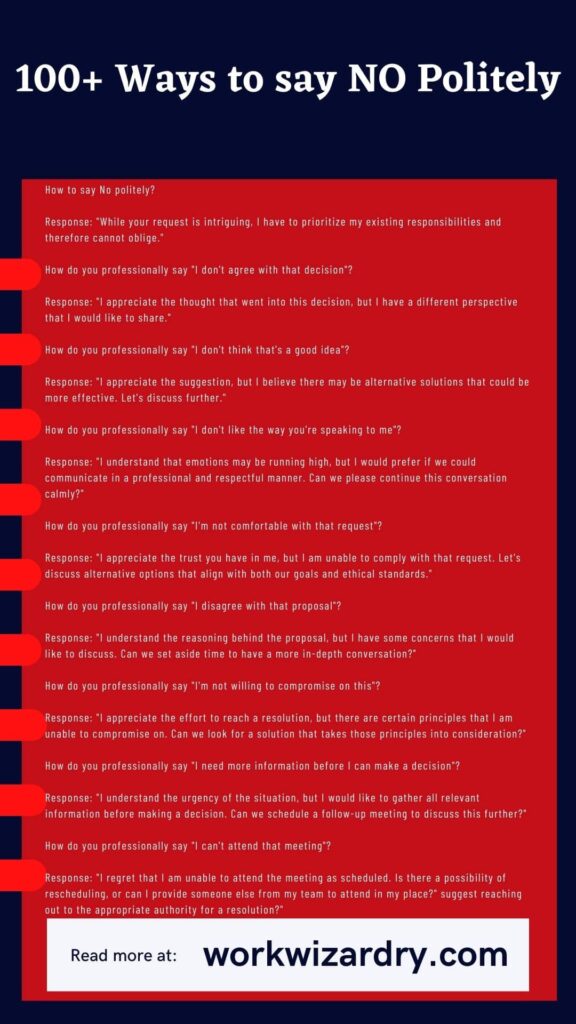During professional and workplace communication, knowing how to say I don’t agree professionally and respectfully expressing disagreement and declining requests with tact and diplomacy is a valuable skill.
Whether you find yourself in a heated debate during a business meeting or faced with a request that you simply cannot accommodate, your ability to convey your dissent or refusal in a respectful manner can make a lasting impression and maintain positive relationships.
This article aims to delve into the art of expressing disagreement professionally and How to say no politely across diverse situations, equipping you with the essential tools to navigate these challenging conversations effectively.

How to say I don’t agree professionally? (100+ Examples)
The following are some tips, respectful ways and example sentences you can use to say “I don’t agree” professionally or in a polite way:
1. Use a polite and professional tone:
“I appreciate your perspective, but I respectfully disagree.”
“Thank you for sharing your thoughts, although I have a different viewpoint.”
“I understand where you’re coming from, but I have some concerns to address.”
“I value your input, but I have a differing opinion on this matter.”
“While I respect your position, I would like to offer a different perspective.”
2. Begin with agreement:
Here are some examples on how to say I disagree professionally:
“I agree with your point about the importance of teamwork, but I see another aspect to consider.”
“We both share the goal of increasing efficiency, and I believe there might be a more effective approach.”
“I appreciate your emphasis on customer satisfaction, and I have a suggestion to further enhance it.”
“I agree that cost reduction is essential, but I think we should explore alternative strategies.”
“Your focus on long-term growth is commendable, and I have a different strategy to propose.”
Also read: 275+ Examples on how to disagree politely phrases in a respectful way
3. Clearly state your disagreement:
The following are a few example phrases on how to say I disagree politely:
“I respectfully disagree with the proposal because…”
“I have a different perspective regarding this issue because…”
“I understand your point, but I have reservations about it due to…”
“I see things differently, as I believe that…”
“I respectfully challenge the idea of…”
4. Support your position with evidence:
These are some example sentences on how to say I disagree formally:
“According to the latest market research, the data indicates…”
“Based on the statistics from our previous project, it is evident that…”
“I have gathered data that supports my viewpoint, such as…”
“The report published by experts in the field provides evidence that…”
“Here are some examples that illustrate my point…”
5. Focus on the issue, not the person:
“Let’s focus on addressing the concern at hand rather than engaging in personal critiques.”
“It’s important to keep the conversation focused on the topic without resorting to personal attacks.”
“We should direct our attention to the matter itself rather than individuals involved.”
“Can we refrain from discussing personal attributes and concentrate on the issue itself?”
“Let’s maintain professionalism by discussing the subject without involving personal judgments.”
6. Use “I” statements:
“I believe that…”
“In my opinion…”
“From my perspective…”
“I think that…”
“In my view…”
7. Active listening:
“If I understand correctly, you’re saying…”
“Could you please clarify your point further?”
“Let me make sure I grasp your argument correctly: you’re suggesting that…”
“I want to ensure that I fully understand your position. So, you’re saying that…”
“Just to confirm, are you suggesting that…”
8. Find common ground:
“Although we may have different opinions, we both share the objective of…”
“Let’s find a middle ground that accommodates both our concerns, such as…”
“Can we explore a solution that meets both our needs, like…”
“I believe we can work together to find a compromise that benefits us all, for example…”
“While we may disagree on certain aspects, I’m confident we can agree on…”
9. Offer alternatives or suggestions:
“Instead of the proposed approach, we could consider…”
“Have we examined the possibility of implementing…”
“I’d like to suggest an alternative option, which involves…”
“What if we explored a different strategy, such as…”
“An idea that might address our concerns is to…”
10. End on a positive note:
“Thank you for sharing your thoughts. I believe this discussion has provided valuable insights.”
“I appreciate your willingness to engage in this conversation, and I’m open to further dialogue.”
“Although we may not have reached a consensus, I’m glad we had the opportunity to exchange ideas.”
“Let’s continue exploring different perspectives and potential solutions moving forward.”
“Despite our disagreement, I look forward to working collaboratively on finding a resolution.”
Frequently Asked Questions on How to say No politely in different situations:

Polite ways to say No at workplace or at any professional setting
The following is a list of polite ways to say no at workplace or at any professional setting:
1. “While I admire your initiative, I’m currently unable to take on any additional projects.”
2. “I appreciate the offer, but I must respectfully decline as it doesn’t align with my current objectives.”
3. “Thank you for reaching out, but I’m afraid I won’t be able to accommodate your request due to prior commitments.”
4. “I regretfully cannot participate at this time, as my schedule is fully booked with other professional obligations.”
5. “I’ve given it careful consideration, but I’m unable to proceed with your proposal.”
6. “I genuinely appreciate your interest in involving me, but I’m unable to commit to this opportunity.”
7. “While your request is intriguing, I have to prioritize my existing responsibilities and therefore cannot oblige.”
8. “After much thought, I’ve concluded that I must decline your generous offer.”
9. “I value your confidence in me, but I’m currently unable to take on any new commitments.”
10. “I regretfully have to decline your invitation, as it conflicts with a prior engagement.”
11. “I’m grateful for your consideration, but I must decline the invitation to participate in this venture.”
12. “Thank you for thinking of me, but I don’t believe I possess the necessary expertise for this endeavor.”
13. “I apologize for any inconvenience caused, but I’m unable to fulfill your request due to time constraints.”
14. “While I understand the importance of the opportunity, I’m unable to take part due to personal reasons.”
15. “I appreciate your offer, but after careful deliberation, I must decline as it doesn’t align with my professional goals.”
Funny ways to say No professionally
Here are some funny ways to say No Professionally and politely:
1. “I’m honored by your request, but unfortunately, my cape is in the shop.”
2. “I appreciate the opportunity, but I’m already fully committed to fighting crime elsewhere.”
3. “I would love to help, but I’m currently on a mission to save the world from mundane tasks.”
4. “Thank you for considering me, but my psychic powers predict that I won’t be available.”
5. “I’m sorry, but I’m allergic to that particular type of adventure.”
6. “I’d love to join, but my superhero costume is at the dry cleaner’s.”
7. “Unfortunately, my superpowers are on a temporary hiatus at the moment.”
8. “I wish I could help, but my superhero schedule is jam-packed with rescuing kittens from trees.”
9. “I’m sorry, but my alter ego has a prior engagement on that day.”
10. “I appreciate the offer, but my superhero intuition is telling me it’s not the right fit.”
11. “Thank you for the opportunity, but I must focus on maintaining the delicate balance of the universe.”
12. “I’m flattered by your invitation, but I’m sworn to secrecy and can’t disclose my superhero whereabouts.”
13. “I’d love to, but my superhero duties demand my full attention at the moment.”
14. “Unfortunately, my superpowers are incompatible with the task you’re proposing.”
15. “I’m sorry, but my superhero senses are tingling, and they’re indicating that I should decline.”
How do you professionally say “I don’t agree with that decision”?
Response: “I appreciate the thought that went into this decision, but I have a different perspective that I would like to share.”
How do you professionally say “I don’t think that’s a good idea”?
Response: “I appreciate the suggestion, but I believe there may be alternative solutions that could be more effective. Let’s discuss further.”
How do you professionally say “I don’t like the way you’re speaking to me”?
Response: “I understand that emotions may be running high, but I would prefer if we could communicate in a professional and respectful manner. Can we please continue this conversation calmly?”
How do you professionally say “I’m not comfortable with that request”?
Response: “I appreciate the trust you have in me, but I am unable to comply with that request. Let’s discuss alternative options that align with both our goals and ethical standards.”
How do you professionally say “I disagree with that proposal”?
Response: “I understand the reasoning behind the proposal, but I have some concerns that I would like to discuss. Can we set aside time to have a more in-depth conversation?”
How do you professionally say “I’m not willing to compromise on this”?
Response: “I appreciate the effort to reach a resolution, but there are certain principles that I am unable to compromise on. Can we look for a solution that takes those principles into consideration?”
How do you professionally say “I need more information before I can make a decision”?
Response: “I understand the urgency of the situation, but I would like to gather all relevant information before making a decision. Can we schedule a follow-up meeting to discuss this further?”
How do you professionally say “I can’t attend that meeting”?
Response: “I regret that I am unable to attend the meeting as scheduled. Is there a possibility of rescheduling, or can I provide someone else from my team to attend in my place?”
How do you professionally say “I don’t have the budget for that”?
Response: “I understand the importance of the initiative, but I have limited budget to allocate at this time. Can we explore alternative options or ways to secure additional funding?”
How do you professionally say “I don’t have the authority to make that decision”?
Response: “I understand the urgency of the matter, but I am not the final decision maker in this instance. Can I suggest reaching out to the appropriate authority for a resolution?”
How do you professionally say “I’m not ready to make a commitment yet”?
Response: “I appreciate the confidence in my abilities, but I need more time to assess the situation before making a commitment. Can we discuss this further at a later date?”
How do you professionally say “I don’t think that’s feasible”?
Response: “I understand the objective, but I believe there may be some limitations that prevent us from achieving that goal. Can we work together to find a more feasible solution?”
How do you professionally say “I need more time to think about that”?
Response: “I appreciate the offer, but I would like to take some time to carefully consider all options before making a decision. Can I get back to you with an Response at a later time?”
How do you professionally say “I’m not willing to take that risk”?
Response: “I understand the potential benefits, but I believe there are significant risks associated with this decision. Can we re-evaluate the risk-reward balance and consider other options?”
How do you professionally say “I don’t have the data to support that”?
Response: “I appreciate the hypothesis, but I am unable to validate it with the data available to me. Can we conduct further research or gather more information before proceeding?”
How do you professionally say “I don’t have the technology to support that”?
Response: “I recognize the potential for innovation, but I am unable to implement that technology with the current infrastructure. Can we explore alternative solutions or invest in upgrading our technology to support this?”
How do you professionally say “I don’t have the resources to implement that”?
Response: “I understand the importance of the project, but I am facing a shortage of resources that would allow me to carry it out effectively. Can we re-evaluate our priorities and allocate resources accordingly?”
How do you professionally say “I don’t have the knowledge to address that”?
Response: “I appreciate the opportunity to provide support, but I am lacking the necessary knowledge to effectively address the issue. Can I recommend seeking guidance from someone with more expertise in this area?”
How do you professionally say “I’m not comfortable with that course of action”?
Response: “I understand the reasoning behind the proposal, but I have some reservations about proceeding in that manner. Can we discuss alternative options or reassess the potential consequences before moving forward?”
How do you professionally say “I don’t have the time for that”?
Response: “I appreciate the offer, but I am facing time constraints that prevent me from taking on additional responsibilities. Can we prioritize existing obligations or re-evaluate our timeline to accommodate this?”
How do you professionally say “I’m not in agreement with that”?
Response: “I understand the perspective, but I have a different opinion on the matter. Can we engage in a constructive dialogue to find a mutually acceptable solution?”
How do you professionally say “That’s not within my job description”?
Response: “I am happy to assist wherever I can, but the task in question falls outside the scope of my role. Can I suggest seeking support from someone who has the expertise or authority to address it?”
How do you professionally say “I don’t have the confidence to handle that”?
Response: “I understand the potential impact of the project, but I feel that my skill set and experience may not be up to the task. Can I recommend seeking a second opinion or seeking training to increase my confidence?”
How do you professionally say “I’m not willing to compromise on that”?
Response: “I appreciate the need for collaboration, but I believe that this particular issue is of the utmost importance and cannot be negotiated. Can we find a solution that addresses both our concerns?”
How do you professionally say “I don’t have the patience for that”?
Response: “I understand the complexity of the situation, but I fear that my limited patience may hinder my ability to effectively address the issue. Can we seek additional support or re-evaluate our approach to the task?”
How do you professionally say “I don’t have the energy for that”?
Response: “I am committed to delivering results, but I am currently facing a lack of energy that is affecting my performance. Can I take a break to recharge or delegate some of my responsibilities to others?”
How do you professionally say “I’m not willing to make an exception for that”?
Response: “I appreciate the request, but I believe that making an exception would set a negative precedent and compromise our established protocols. Can we adhere to established procedures or explore alternative solutions?”
How do you professionally say “I don’t have the motivation for that”?
Response: “I understand the significance of the project, but I am struggling with a lack of motivation that is affecting my performance. Can I re-evaluate my goals or seek inspiration from my colleagues to increase my motivation?”
How do you professionally say “I don’t have the budget for that”?
Response: “I understand the potential benefits of the project, but I am facing budget constraints that limit our resources. Can we prioritize other expenses or seek additional funding to make this possible?”
How do you professionally say “I don’t have the capacity for that”?
Response: “I appreciate the need for support, but I am already stretched thin with current responsibilities. Can I suggest seeking help from other colleagues or re-evaluating our workload to free up capacity?”
How do you professionally say “I’m not familiar with that technology”?
Response: “I am willing to learn and adapt, but I am currently unfamiliar with the technology in question. Can I suggest seeking training or seeking guidance from someone who has experience with it?”
How do you professionally say “I’m not comfortable with that level of risk”?
Response: “I understand the potential rewards of taking a risk, but I am uncomfortable with the level of uncertainty involved. Can we mitigate the risks or seek alternative options that align with my comfort level?”
How do you professionally say “I don’t have the authority to make that decision”?
Response: “I appreciate the opportunity to contribute, but I lack the authority to make the decision in question. Can I suggest seeking approval from a higher-up or following established protocols for decision-making?





